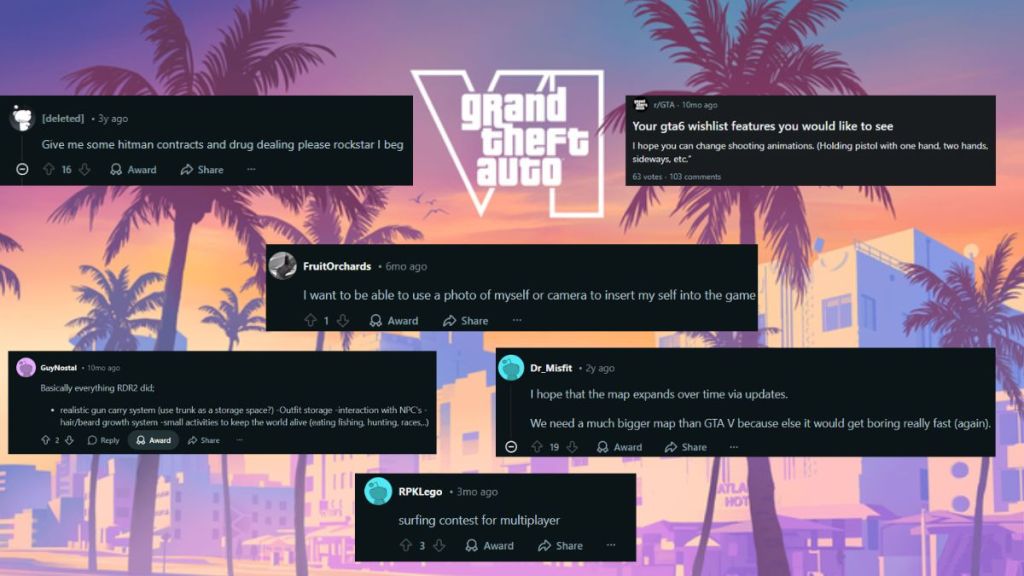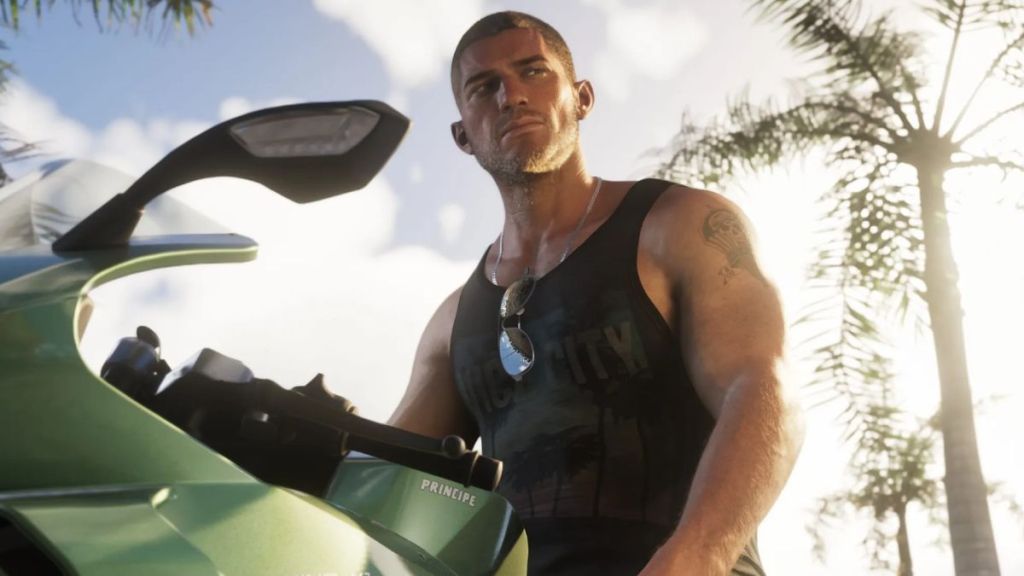
For a game that will almost certainly rattle the foundations of our industry, the run-up to GTA 6’s release sure has been a whole lot of nothing. Compare its promotional cycle to the likes of Cyberpunk 2077, Final Fantasy VII Remake, Elden Ring, and other AAA juggernauts that had sold millions of copies before being minted on a single disc, and the differences in visibility are pretty stark.
All the games mentioned above had something to show for their promise, be it a 48-minute gameplay demo that was basically my north star through COVID, or the reaction of frenzied fans to the return of a timeless classic.
Since announcing GTA 6 in 2022, all Rockstar has served up are a couple of trailers, a smattering of screenshots, and two dismal delays. Credit where it’s due, both trailers showcase the sizzling dynamic at the heart of the narrative, set to sumptuous needle drops with a gorgeous urban sprawl hogging the backdrop. But at the end of the day, they’re trailers, with no cutaways to actual, intelligible gameplay. If this were any other publisher promoting an IP not named Grand Theft Auto, we’d all be side-eyeing in the YouTube comments section and wondering if it looked too good to be real.
Thanks to all the success and honors Rockstar has accumulated over the years, GTA 6 gets to bask in the sweet, sweet comfort of pedigree privilege. The game sustains its insane anticipation despite minimizing visibility or being pushed back by an entire year. The notion of its inevitable arrival gets to reverberate through the boardrooms of studios the world over, who shuffle and scamper to lock down a release date outside of its splash zone. In a nutshell, GTA 6 gets to dominate cultural conversion while holding the most effortless poker face imaginable.
This is an exhibition of how effective silence can be, if you’re a multi-billion-dollar studio at least. You let endless speculation and the general idea of your product serve as promotional tools while cooking in veritable peace, but there is an obvious downside to this approach. By keeping quiet for too long and not defining the scale of what you’re building, fans are granted the headroom to think out as loud as possible. So when the final outcome fails to meet those lofty expectations, the game unfortunately loses the luxury of being judged on its own merits in the court of public opinion.
This tightrope of expectations and amicable silence can be treacherous to navigate, especially when nothing less than a revelatory release will satiate the hunger of your long-starved audience. With 12 months to go until GTA 6’s release, it’s safe to say that the aforementioned hunger is more ravenous than ever. And in the latest edition of my ramblings, I’ve taken a stab at illustrating how this cuts both ways for Rockstar.
Rockstar and GTA 6 Are Carrying Expectations Too Heavy to Deliver

It wouldn’t be crazy to say that no single franchise has advanced the open-world sandbox more than Grand Theft Auto. From its earliest entries that helped establish the many interactions one could have within an open world to the bona fide game-changer that was GTA 3, this is a franchise that hasn’t just evolved over time but also transformed the genre as a whole.
There’s this ineffable balance of realism and video game-y chaos baked into every square inch of Los Santos that makes GTA 5 so immediately absorbing all these years later. Staged atop that foundation is GTA Online and the thriving RP scene – arguably the most immersive interactive experience that digital media has to offer.
All this is to say that Rockstar might’ve already perfected the formula for its marquee product, yet with GTA 6, they’re expected to deliver on an entirely different level. Take a cursory gander through the r/GTA subreddit, and you’ll find fans hatching up wishlists of features they’d like to see, each more audacious than the last.
They’re looking for an evergreen life-sim with dynamic NPC interactions, perfectly polished visuals, painstaking attention to detail, branching quest design, punchy combat, realistic physics, multiple garages’ worth of vehicles, romanceable characters, a jaw-dropping narrative, and the list goes on and on and on. Rockstar has ticked a few of these boxes in their previous projects, but it has never developed a tour de force that delivers in every single metric.

And these are just baseline requirements; this is what fans have always wanted GTA 6 to be. The endless silence and the pesky delays have a mushrooming effect on these expectations, turning a herculean task into an almost impossible fantasy. I observed a similar phenomenon in the prolonged run-up to Cyberpunk 2077’s release, where, despite CDPR’s attempts to manage expectations, the community clung to the hopes of a ‘perfect game’ – the be-all and end-all product that they would never need to move on from.
The longer Rockstar keeps the lid on detailed info, the more room it leaves for fans to build the game in their heads. As a passionate community, we start to imagine things that are entirely out of reach for any developer, even one as skilled as Rockstar. With every passing month, the dream becomes more elaborate, and the potential for disappointment grows. After all, how can any game possibly live up to a version of GTA 6 that has been co-created by an anxious fanbase, where every player has their own vision of perfection?
When GTA 6 is finally released, it will face one of the toughest challenges in our medium’s history: to live up to a decade of pent-up anticipation and wild expectations. The title will likely deliver outstanding visuals, an engaging story, and innovative gameplay, but will this be enough to satisfy a community that has built an inconceivable game in their minds? And worse, will the inevitable criticisms tarnish the legacy or the impact of what is a homerun when assessed on the sum of its parts?

In this specific case, it’s clear to see that silence isn’t calming the speculation; it’s fertilizing it. Expectations don’t plateau in the absence of information; they metastasize to the point where ‘great’ no longer feels sufficient, and only ‘generation-defining masterpiece’ will do. If GTA 6 stumbles even slightly, even in ways that would be forgiven under normal circumstances, the weight of this silence may become the very thing that warps conversation around what could otherwise be heralded as a phenomenal achievement.
Delayed Gratification Hurts Now, but GTA 6 Could Be the Ultimate Reward
On the flip side of the coin, there’s a reason Rockstar has earned a reputation as the studio that seemingly never misses. Time and time again, it has taken lengthy development cycles, paired them with minimal marketing noise, and delivered games that feel polished, expansive, and impossibly alive.
The prime example of this is Red Dead Redemption 2, which turned down a pretty obvious layup by sidelining John Marston (an established character that fans were itching to see more of) in favor of a fresh face in Arthur Morgan. The frontier epic also endured a year-long delay, just like GTA 6, and still managed to stun audiences upon arrival.
To this day, the game remains relevant when it comes to the cultural conversation. Players are still marvelling at the sheer scope and breadth of the package, which stretches far beyond the rootin’ tootin’ surface. They’re still dissecting the molecular makeup of its sweeping narrative, down to the behavioural ticks of every character. And they’re still discovering bizarre details that only Rockstar would be insane enough to consider, like how swirling around in a hot spring could stir up a brief whirlpool.

In this context, the silence surrounding GTA 6 takes on a different hue. Rather than leaving the community frustrated, it can be seen as an exercise in delayed gratification. By revealing only the barest glimpses of gameplay, Rockstar keeps the imagination of the fanbase engaged, allowing anticipation to simmer rather than boil over. The studio is almost welcoming of the wide-eyed optimists and the crackpot theorists, knowing that their creation is capable of sweeping them away.
This is absolutely a naive outlook on their approach, but I’d like to think that the silence is in service of a greater payoff. Simply put, the longer the wait, the greater the sense of arrival when the game finally releases. And when years of speculation, hope, and rumors coalesce into the final product, the satisfaction is almost quadrupled.
While peering through my finest rose-tinted glasses, Rockstar’s restraint in broadcasting an extensive gameplay presentation also gives them the space to polish the title without any external noise. Given the hype surrounding GTA 6, you can always count on a section of fans to pinpoint the smallest, most meaningless inconsistencies and drum them up as critical flaws. How many times have we seen developers reel in their original vision after a mixed gameplay presentation? By keeping GTA 6 under wraps, Rockstar sidesteps this pressure entirely.
This strategy of silence then becomes a protective measure, not just for the game, but for the creative process itself. Fans may speculate endlessly, but the developers retain control over the story they want to tell, the experiences they want to craft, and the world they want players to inhabit.
When the curtain finally rises, it won’t just be a polished product, but also the game Rockstar always intended, free from the compromises that premature exposure can force. In this light, the delayed gratification isn’t just about teasing players; it’s about safeguarding the integrity of the game, ensuring that the wait ultimately rewards us with something extraordinary.
With all that being said, do you think Rockstar’s policy of silence is a wise tactic or will it lead to the issues I’ve discussed above? Share your takes in the comments.







